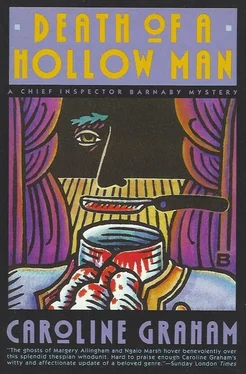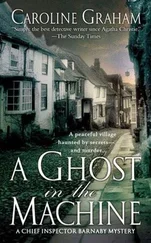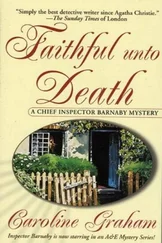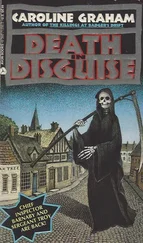He had briefly considered trading her in when Rosa had come on the market, seeing the latter as a far more suitable mate for a producer. (Sometimes he wondered if Doris was really grateful for, or even aware of, the status that his position as the town’s only theatrical impresario conferred.) However, after exposing this fleeting fancy to the cold light of reason, Harold had to admit that it was gravely flawed. Rosa was used to, nay, reveled in, her role as leading lady, and he could not see her deliberately lowering her wattage to show him to best advantage. Whereas Doris, in spite of her peculiar absorptions—pickling eggs, drying flowers, and stuffing innocent knitted creatures with chunks of variegated foam—did have the supreme virtue of dimness. Indeed, Harold was pleasureably aware that when he entered a room, she practically vanished into the woodwork like the moth Melanchra persicariae. And perhaps most important of all, she was not grasping. He had provided modestly for his wife and children, far more modestly, in fact, than he might have done. Over half the profits he made from his business went into his productions, so that whatever snipers might find to criticize in any other direction, they could never say the play was not well dressed.
An amber rectangle of light fell across the windshield. “Harold?”
Harold sighed, gave the mileage dial a final quick polish with his hankie, and called, “Give me a chance.”
He struggled out of the cockpit. This was the cutoff point for him. The moment when he turned away from the full-blooded rumbustious razzle-dazzle rainbow ring of circus and stepped into the shady gray half-formed and quite unreal world of bread.
“Your supper’s getting cold.”
“Dinner, Doris.” Already consumed with irritation, he pushed past her into the kitchen. “How many times do I have to tell you?”
“How has he been, Mrs. Higgins?” Deidre entered the kitchen quietly through the back door, and the elderly woman dozing by the fire jumped. “I’m sorry. I didn’t mean to startle you.”
“He’s been ever so good,” replied Mrs. Higgins. “Considering.”
Deidre thought the “considering” uncalled for. They both knew that Mr. Tibbs wasn’t always ever so good and why. Deidre glanced at the mantelpiece. Mrs. Higgins’s envelope had gone, and Deidre spied it sticking out of the woman’s grubby apron pocket as she heaved herself to her feet. “Upsadaisy.”
“Is he still asleep?”
“No. Just chatting away to hisself. I made him a lovely plate of soup.”
Deidre spotted the tin in the sink, said, “You’re so kind,” and helped Mrs. Higgins on with her coat. The thankfulness and gratitude in her voice were not feigned. If it were not for Mrs. Higgins, Deidre would have no life at all. No life, that is, apart from home and the Gas Board.
Because where else would she find someone to sit with a befuddled old man for a couple of pounds? Not that the money was ever mentioned. The first time Mrs. Higgins came, Deidre had offered, only to be told, “Don’t you worry dear, I’d only be sitting next door on me tod watching the goggle box.” But the coins Deidre had left under the teapot disappeared, and so, always since then, had the manila envelope.
When Mrs. Higgins had gone, Deidre locked and bolted the door, put some milk for her Horlicks on a very low heat, and climbed the stairs. Her father was sitting up ramrod straight in crisp pajamas under a large, dimmish print of “The Light of the World.” His gray, still faintly gingery mustache was soaked with tears of joy, and his eyes shone. “He is coming,” he cried as Deidre entered the room. “The Lord is coming.”
“Yes, daddy.” She sat on the bed and took his hand. It was like holding a few slippery bones in a bag of skin. “Would you like another drink?”
“He will take us away. Into the light.”
She knew it was no good trying to settle him. He always slept upright, his back bolted into a perpendicular line against a cumulus of pillows. She patted his arm and kissed his damp cheek. He had been a little bit disturbed for several months now. The first indication that all was not well had occurred when she arrived home from the theater one night after set-building to find him in the street going from house to house, rapping on doors and offering the startled occupants a shovelful of live coals.
Horrified and amazed, she had led him back home, replaced the coals on the kitchen fire, and questioned him gently, trying to find a rational explanation. Of course there had been none. Since then he had frequently been befuddled or confused. (Deidre always used these unemphatic terms, avoiding the terrible official definition. When one of the workers at the center where Mr. Tibbs spent his days had used the word, Deidre had screamed at her in fear and anger.)
He still had lengthy periods of marvelous clarity. There was just no way of knowing when they would arise or for how long they would last. The previous Sunday had been a lovely day. They had gone for a walk in the afternoon, and she had been able to tell him all about Amadeus, exaggerating her role in the production as she always did to make him proud of her. In the evening they had had a glass of port and some lumpy home-made cake, and he had sung songs that he remembered from his childhood. He had been over forty when Deidre was bom, so the songs were very old ones. “Red Sails in the Sunset,” “Valencia,” and “Oh, Oh, Antonio.” He had put on his bowler hat and tapped and twirled his stick, shuffling in a sad, transmogrified echo of the routines he had leaped through when, years before, he had so delighted Deidre and her mother. His hair had been reddish gold then, and his mustache had gleamed like a ripe chestnut. They both wept before going to sleep last Sunday.
Deidre crossed to the window to draw the curtains, and stood for a moment looking up at the sky. There was a brilliant moon and a cavalcade of scudding clouds. Gabriel, her guardian angel, lived up there. As well as on the earth walking, bright and shining, just an immortal breath away, keeping a loving eye on the Tibbses’ worldly concerns. When she was a little girl, Deidre would whip around quickly sometimes, as she did in a game of statues, hoping to catch sight of his twelve-foot wings before he put on his invisible cloak. Once, she was convinced she had found the outline of a golden footprint before hearing, over her head, a rushing, beating swoosh of sound, like the passing of a thousand swans.
As well as the archangel, everyone had a star to watch over them. When she had asked her father which was hers, he had said, “It’s always the star that shines the brightest.” They all looked the same tonight, thought Deidre, letting the curtain fall, and rather cold. She remembered the milk and hurried down to the kitchen just too late to stop it boiling over.
She refilled and replaced the pan, then took her script for the next production, Uncle Vanya, from the dresser. It has been dissected and reassembled, interleaved with blank pages, as had all the copies of plays on which she had been assistant stage manager. Deidre worked long and ardently on every one before the first rehearsal. She would read and reread the play, getting to know the characters as well as if she had lived with them. She struggled to realize the subtext and sense the tempo. Her head buzzed with ideas on staging, and she used long rolls of thin cardboard to design her sets. She was as enthralled by Uncle Vanya as she had been by The Cherry Orchard, intoxicated by Checkhov’s particular ability to produce a seemingly natural world full of precisely observed, psychologically real human beings, then reconcile this world with the urgencies of dramatic necessity.
Now, becoming aware that she was hungry, she closed Uncle Vanya and put the book aside. She hardly ever managed to eat on theater evenings, not if she wanted to be on time. She found a bit of salad dressing in the fridge together with a small, hard piece of leftover beef and two slices of beetroot, and while spreading margarine on the stretchy white bread that was all her father’s gums could tackle, she slipped into a frequent and favorite reverie in which she reviewed edited lowlights from the latest rehearsal, rewriting the scenario as she went along.
Читать дальше












